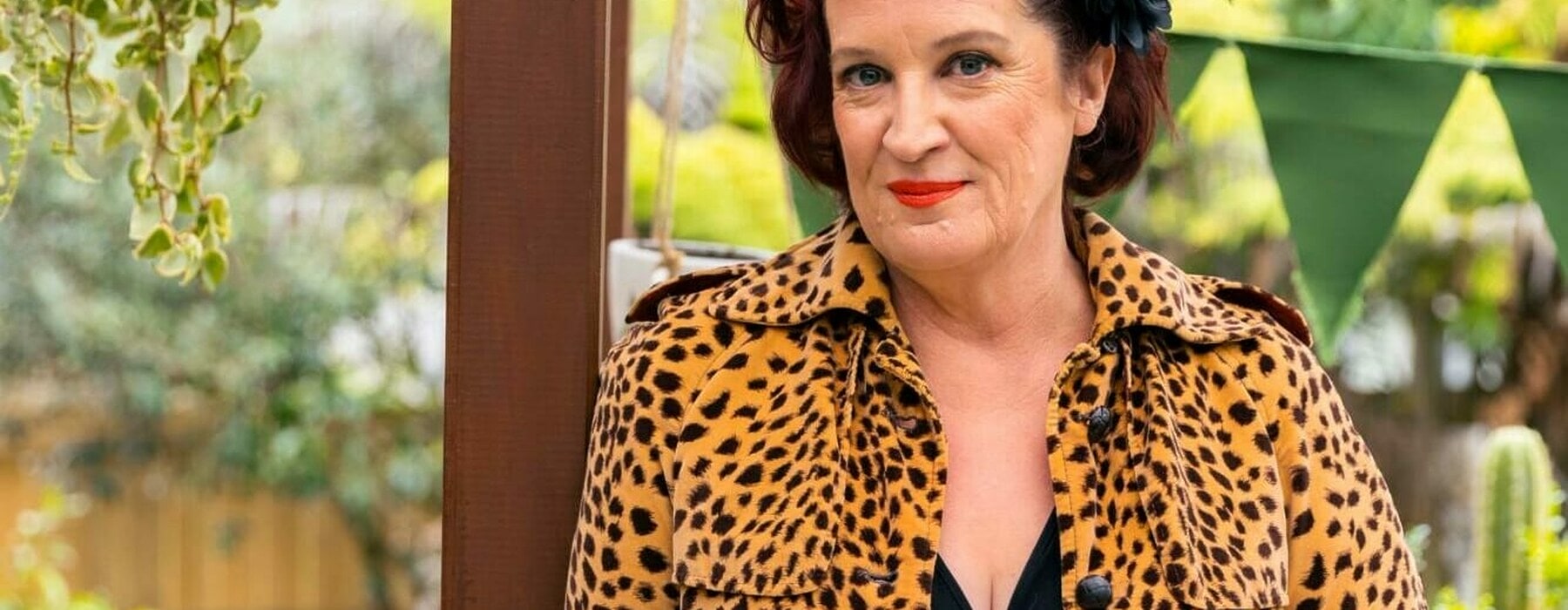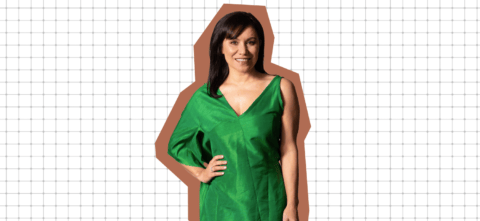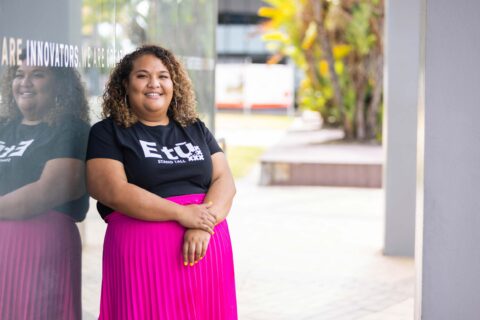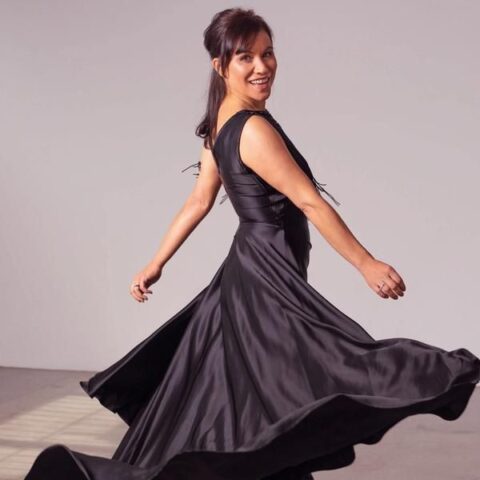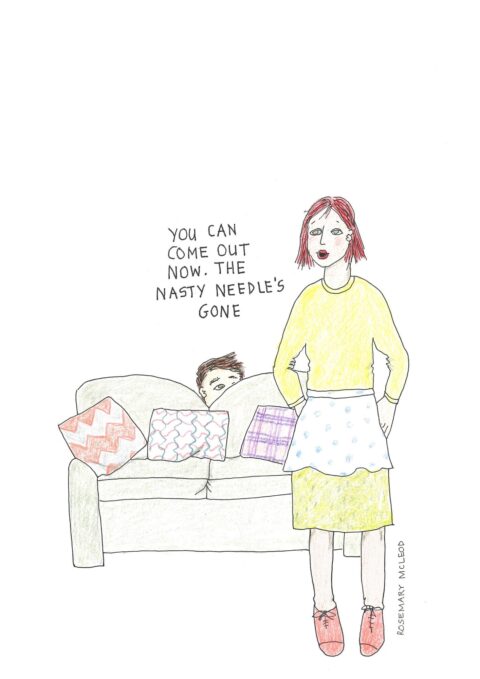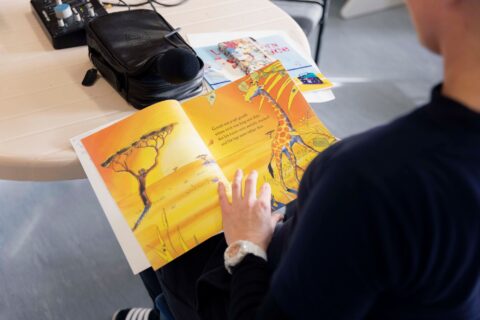Kiwi comedy queen Justine Smith is shaking up the stand-up scene. She talks to Siena Yates about helping to make the industry safer for women – and her enduring obsession with all things Disney.
With a shock of deep-red hair, a cartoon Minnie Mouse bow inked into her forearm and a classic black-and-white Minnie on the back of her leg, Justine Smith is a woman who wears her personality on her sleeve.
The comedy mainstay also has a boisterous, melodic laugh and talks with very little filter and an ever-shifting focus. When we meet in an Auckland café over a couple of pots of tea, she changed gears in the conversation multiple times. There’s the moment when a woman with a stylish, short haircut walks in and catches her eye – “She looks fun, if I were brave enough, I’d cut my hair like that” – and, more notably, when a pregnant woman passes by, Justine, 52, dives into the conversation of why she doesn’t want kids.
The way she addresses this subject tells you a lot about Justine – she’s a woman who doesn’t mince words, values fun and doesn’t care what anyone thinks. And she loves a good swear word.
“No. F*** no. No, thank you. It’s not for me. Cats and dogs. That’s it for me.”
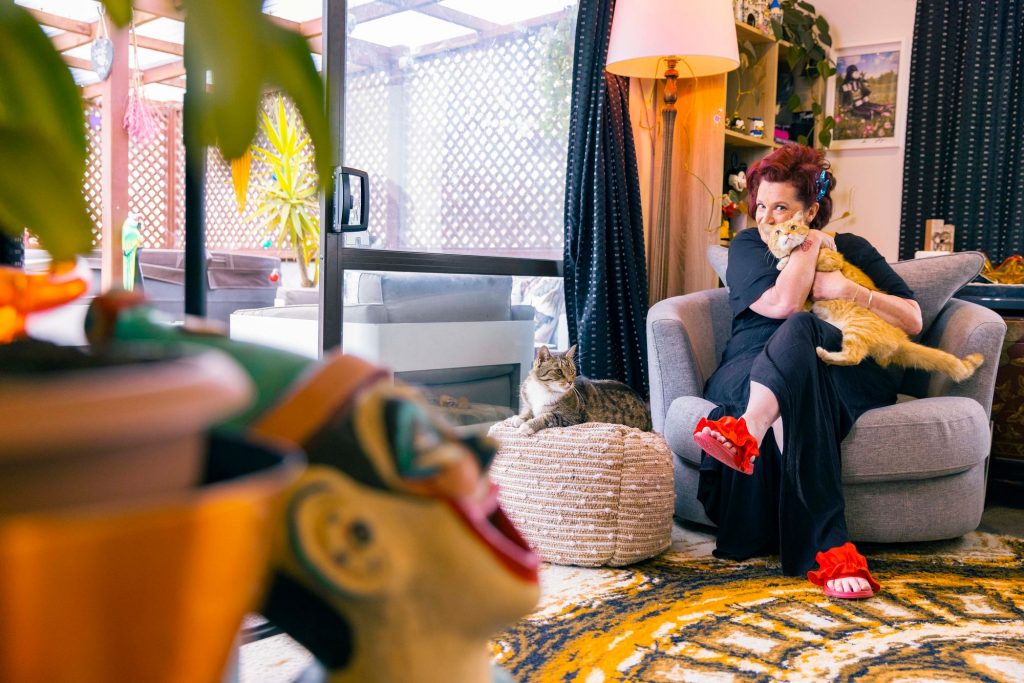
Hell, even a dog is an ask. Her husband Dan Crozier wants one but, “I’m too commitment- phobic,” Justine says. She didn’t get married until she was 44 and that was only because she met Dan, and his desire to wed gave her the same desire for the first time in her life.
Before they met, she was a self-described “drifter”. Not in a bad way, but in much the same way that her conversation tends to drift, following her heart and interests, and often on a whim.
But then Dan, whom she met through a mutual friend, became “an anchor”.
“People always ask, ‘Is your husband a comedian?’ and I’m like, ‘Hell, no!’ That’s not for me. There’s not enough room in any room. Dan’s a really quiet, calm, kind person who works in mental health and, you know, I’m… not,” she laughs.
I’ve got the best marriage I’ve ever come across…He’s just like a lovely calm island in the ocean of life
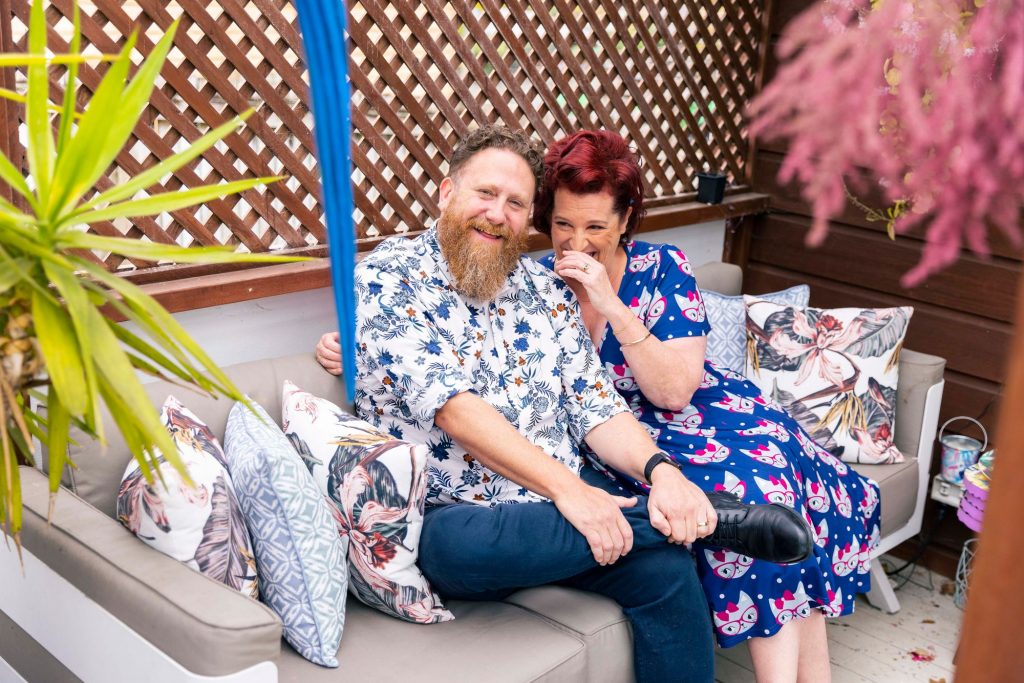
“Marriage has made me a lot calmer. I just feel like everything’s better now, being married. Honestly, damn, I’ve got the best marriage I’ve ever come across. We never argue. I mean, I’m a bit of a nightmare sometimes, but he’s just like a lovely calm island in the ocean of life,” she says, chortling at her own corniness.
“He’s really funny, he’s my best mate. I miss him and I just saw him this morning. We’re pretty revolting, I know. But it’s all about not settling. I didn’t get married till I was 44 and I was single for literally my whole thirties. I just went, ‘F*** that – no more.’ I love being on my own. But then you never know.”
Marriage may have calmed the seas of Justine’s life, but it certainly didn’t slow down the journey. The pair now live a life based around fun and laughter – and a shared obsession with all things Disney.
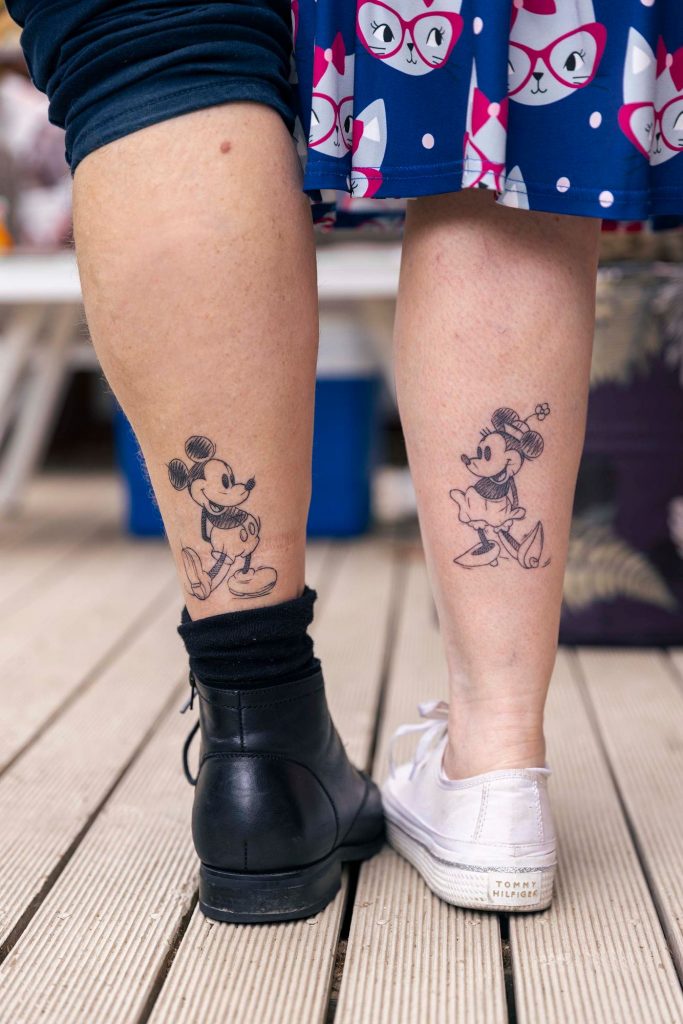
Even their wedding had some distinct nods to Disney, like Mickey and Minnie pictures on the bathroom doors and a Disney dessert bar. No princess dress though. “S*** no! I’m not a princess type. I’m more of a Pooh Bear type.”
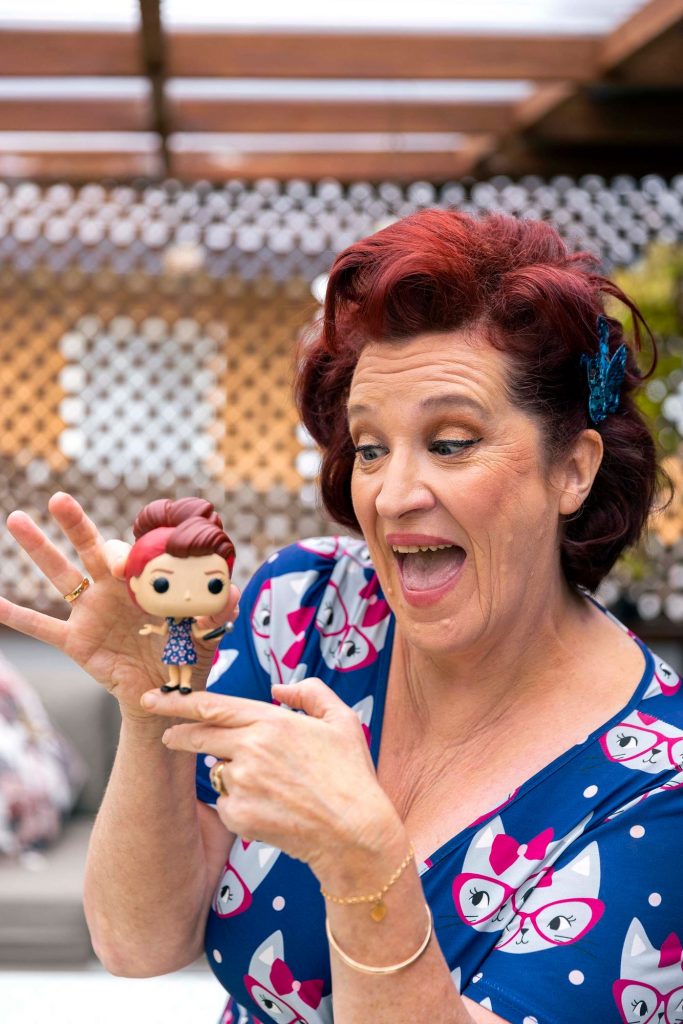
PHOTO BY LUKE HARVEY
There wasn’t an official honeymoon, but they did travel to Disneyland later that year says now, “There’s nowhere else I’d rather go,” says Justine. A few years later, they followed that getaway with a massive trip to the Disneyland parks in Paris, Shanghai and Tokyo to mark Justine’s 50th birthday.
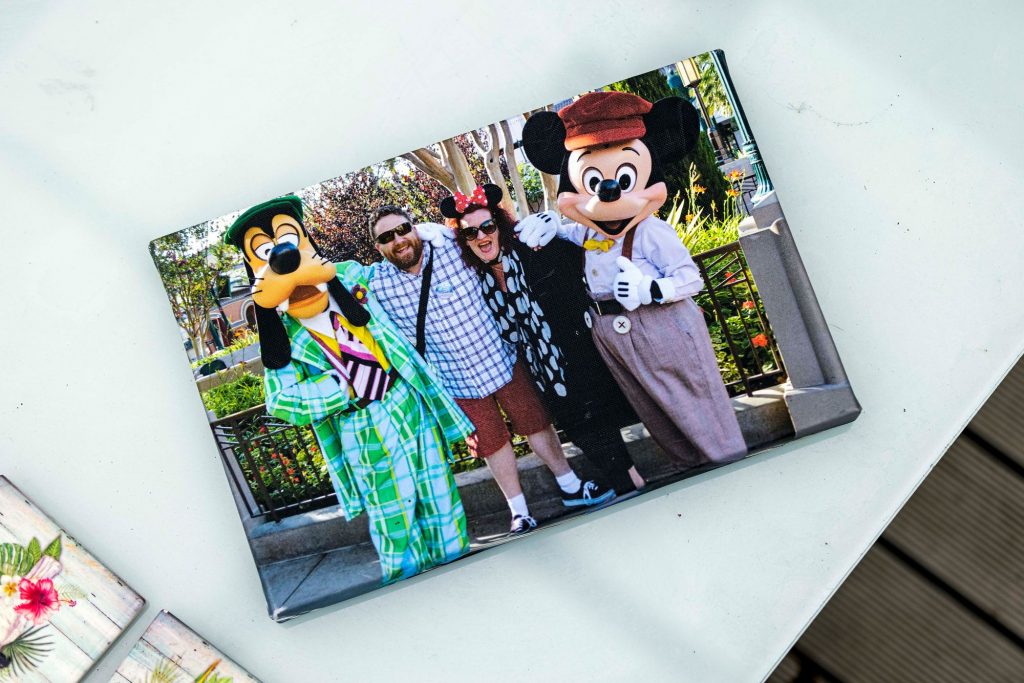
So where does the obsession come from?
“Growing up when I did, it was always Disney Sunday night movies and I always wanted to go to Disneyland,” she recalls. But more than that, “We got engaged at Disneyland in LA. Dan proposed on the teacups, it was so f***ing cute, and so it kind of just became a thing.”
Disneyland, and all other travel, has of course been put on hold the past year, but that’s been the least of the couple’s Covid-related worries.
Being a comedian reliant on gig culture and TV work – Justine is a regular on The Project and 7 Days – meant the star’s career took a hit, and not just while the country was in lockdown. She and other comics continued to feel the strain afterwards as businesses and venues struggled to bounce back.
On one hand, Justine was secretly a bit grateful to get a break, plus, she says, “I quite enjoy sitting in my house. We [comedians] took a hit financially though and we still are because hospitality and comedy are so tightly interwoven that a lot of places have really suffered and can’t afford to put s*** on anymore. But we’re bouncing back, and thankfully, The [Classic Comedy Club didn’t fold because that was a massive worry for us. That would’ve just been devastating.”
Justine’s been in comedy since The Classic opened in 1997, having started in her twenties at the encouragement of – or rather, literal shove in the right direction from – a close friend.
Before that, she’d studied for a diploma in photography and spent time travelling and working in hospitality, though that wasn’t her calling. “Ponsonby Rd is a bit of a walk of shame for me,” she admits. “I got fired from Prego, got fired from One Red Dog. I think I got fired a couple of times from Atomic, but just kept going back. I was the worst.”
All that changed when a friend she met at a café job, fellow comedian Emma Lange, dared her to do a stand-up open mic. Justine tried and chickened out twice before she was finally able to actually get herself into the venue, at which point Emma had to literally push her on stage to perform.
“That was just an absolute game changer for me, that night,” says Justine. “It sounds really cheesy, but I walked out of that pub and felt that I’d just turned this massive corner. I felt like, finally, at 26, I just went, ‘Oh my God, I’ve found my thing!’”
Despite her initial fear, and the fact that she can still get really nervous before a gig after all these years, Justine wouldn’t change a thing. “The things that make it so terrifying are the things that also make it so rewarding,” she says.
Now, Justine’s discovered a new element of the stand-up scene that’s offering even more reward. She’s recently found herself taking on the unofficial role of “aunty” in the comedy world, particularly in Auckland, where she’s lived and worked since leaving home at around 17.
There have been some important shifts in recent years, which have seen Justine become a mentor to young women starting out in comedy, helping them to navigate their careers but also their safety.
“You know, people used to ask me a lot, ‘Why don’t more women do comedy?’ And I would say, ‘I really don’t know.’ But I’ve come to realise that it’s because it’s just a s***ty environment for them.
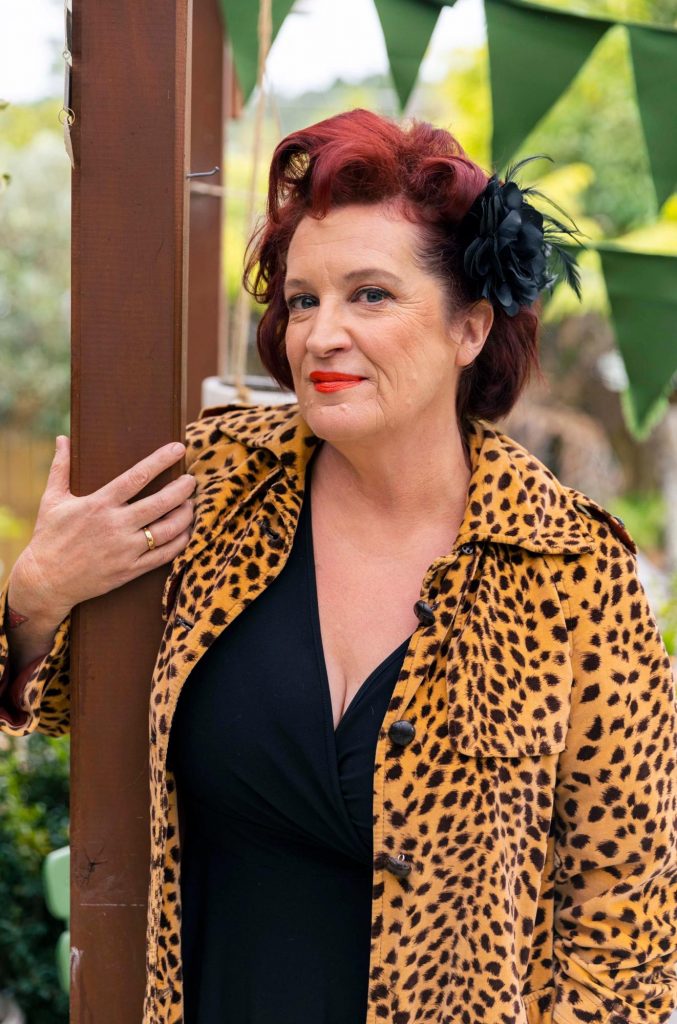
“I started when I was 26. I’d already travelled, I’d worked in bars, I was a pretty tough cookie, So I was always treated really well by the boys in the industry, but a lot of other younger women haven’t been. And it’s not necessarily from other comedians, it’s just our workplaces – it’s at night, there’s alcohol and drugs and a lot of pubs and clubs. But it’s something we’re working really hard to change,” she says.
In the past year, the industry has been purposefully working to become safer and more accessible for women. It’s thanks in part to the #MeToo movement, but has also been inspired by a similar move in Ireland.
“There were female comedians going, ‘Actually, we need to sort our s*** out, make sure that we’re not turning a blind eye, make sure women are supported and that we have more than one f***ing woman on the line-up so you’re not the only one in the f***ing green rooms,” says Justine, exasperated.
What followed, in New Zealand, was a nationwide anonymous survey of women in the industry, and a hui to discuss the results, in which Justine says, “There was some pretty hideous s***.”
As a result, the comedy community has drawn up a code of conduct and created a team whose job it is to help women if they’re feeling unsafe or have had something said or done to them. And, Justine adds, “We’ve actually just weeded out a few bad eggs, so hopefully, moving forward, it can be a better community.”
The hui was also something of a wake-up call for Justine, who, until then, had assumed she’d miraculously avoided the hardship other young women go through in the industry. Walking into the hui, she said to her friend and fellow comedian Michele A’Court how lucky they were that nothing like that had ever happened to them.
Justine remembers, “Michele just went, ‘Really? Why don’t you have a good f***ing think back.’ Then I had this whole renaissance of going, ‘F***ing hell. Yeah. It was bad.’”
I had this whole renaissance of going, ‘F***ing hell. Yeah. It was bad.’
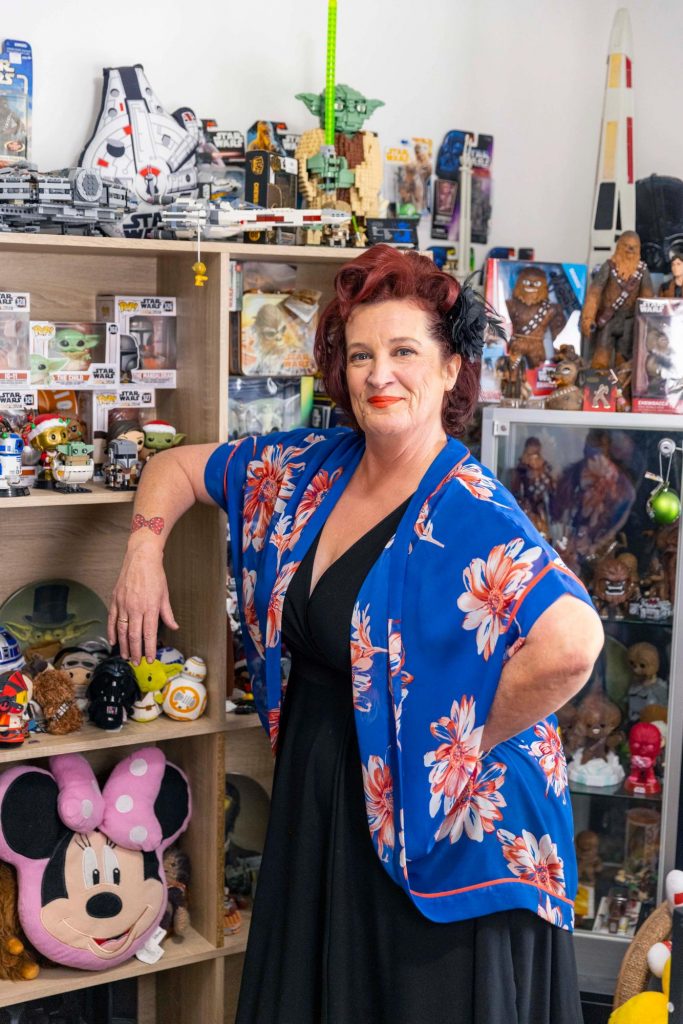
Thinking back after that, she recalled “some horrific s***”, but it was all so normalised that she’d barely given it a second thought.
“I used to get an outro and – particularly if I’d done well – I’ve had more than one male comedian go, ‘Oh yeah, please give it up for Justine Smith. I’ve f***ed her, she wasn’t that good.’ Just things like that, you know?
“Back when I started, it was a pretty racist, sexist environment and people would say things on stage that are really bad, and I think the pendulum has swung quite far the other way. I think we are living in quite a PC environment, but for me, I’m 100% OK with that because it was so hideous for so long.”
That’s why she’s stepping up for the next generation of women in comedy. The unofficial role of “aunty” is one she used to reject because she assumed it was “only because I’m old”, but now, she’s embracing it in terms of acting as a mentor and how she conducts herself and the people she’s seen to be friends with. It’s all about “leading by example and not taking any s*** from anybody. I want to make sure that I’m fierce like that in their eyes,” she says.
“That comes from feeling like I didn’t do a very good job at that before and feeling that I was kind of in a bit of a lad pack, and that makes me feel a bit gross now. It also comes from that recent realisation that, actually, I did take s*** from the boys and that really, really spun my head around.
“There are these wonderful young women who’ve got something to say, who are fabulous and funny, and I don’t want them to walk into a room full of stale old white guys, and feel that they don’t belong there, because women are hilarious, they’re so funny, and they absolutely do belong there.”

